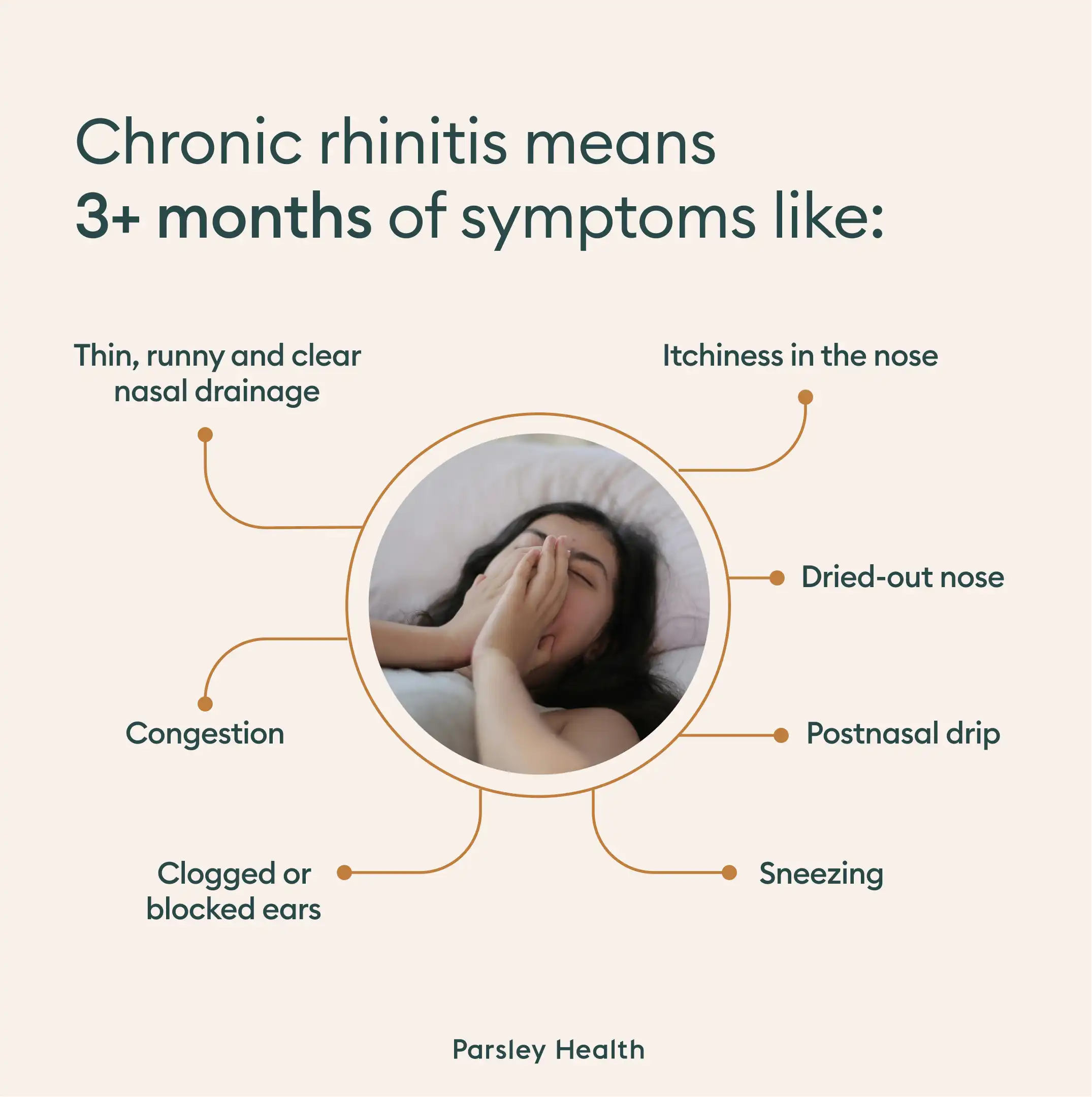You expect sniffles, sneezes, and stuffiness when you have a cold. Sometimes, though, there’s little respite and symptoms linger far longer than you anticipated. In fact, they can last for months or even years. This is called chronic rhinitis. If you’ve been struggling with nasal symptoms and haven’t found answers, this article will walk you through all of the (many) causes of chronic rhinitis, important functional testing, and the lifestyle and medical interventions that make up an effective treatment regimen.
Annoying nose itchiness? Constant postnasal drip causing you to clear your throat all the time? Sneezing that makes people ask "how are you still sick?" Sounds like it could be chronic rhinitis, a condition featuring symptoms like congestion and a runny nose that lingers for way too long. It can be extremely frustrating to try to treat chronic rhinitis, because there are so many causes. Some treatments may address your symptoms a little bit, but for full control, you’ll need comprehensive testing so you and your doctor can take a root-cause approach and develop targeted treatments. Here’s where to start.
What is chronic rhinitis?
First, let’s talk about rhinitis. “Rhinitis is inflammation of the nose,” says otolaryngologist Tonia Farmer, MD (aka Dr. Nose Best). There are two types of rhinitis:
- Allergic (caused by things like seasonal allergies)
- Nonallergic (caused by things like a viral infection)
If you’re stuffed up with a cold for a week (or more), it can feel like a clogged-up nose will never go away. But, once your body clears the virus from its system and inflammation subsides, rhinitis should ease up, too. This is an example of acute rhinitis.
Chronic rhinitis, however, comes in when symptoms (see below) are present for more than three months, says Jessica Lee, MD, a double board-certified physician in otolaryngology and lifestyle medicine in Charleston, SC.
Not sure what your symptoms are really telling you?
The Parsley Symptom Index helps connect the dots across your whole body so you can understand patterns, not just isolated symptoms.
Symptoms of chronic rhinitis
You might be dealing with chronic rhinitis if you’ve had the following symptoms for at least three months, say Drs. Farmer and Lee:
- Congestion
- Itchiness in the nose
- A dried-out nose, resulting in nosebleeds
- A feeling of “clogged” or “blocked” ears
- Nasal drainage that is thin, runny, and clear. (And your nose is constantly running.)
- Postnasal drip, symptoms of which include mucus drainage into the throat, urge to clear your throat, nighttime cough, and/or bad breath
- Sneezing

Causes of chronic rhinitis
When we consider the causes of chronic rhinitis, we’ll want to go back to the two big buckets of allergic and nonallergic rhinitis, since different factors contribute to each.
Causes of allergic rhinitis include:
- Allergies: An immune system overreaction to pollen, mold, animal dander, or dust in the environment that triggers symptoms.
- Nonallergic rhinitis: This means “everything else that’s not due to allergies.” This can include:
- Age-related changes in the function of the nose (called geriatric rhinitis).
- Foods, commonly hot and spicy foods (called gustatory rhinitis).
- Food sensitivities due to poor gut health
- Chemicals, dust, or fumes in the workplace (called occupational rhinitis)
- Side effects from certain medications like beta blockers for high blood pressure and NSAIDs (called drug-induced rhinitis).
- Fragrances and smoke
- Mold exposure
- Post-viral infection complications
- Certain infections like syphilis
It’s also common to have a combination of factors listed above, making eventual diagnosis and treatment a bit more complex. Sometimes, doctors have a difficult time pinpointing the exact cause.
The immune system and chronic rhinitis
Your immune system plays a central role in chronic rhinitis. If your rhinitis is caused by allergies, it’s your immune system that’s gone haywire, treating environmental substances such as pollen as if they’re a dangerous invader to be eliminated. Your body mounts an inflammatory response to fight back—and you’re left with sniffly, stuffed-up, sneezy symptoms day in and day out.
Nonallergic rhinitis also causes immune system trouble when it becomes chronic. It’s normal for your nose to get drippy and clogged when you catch a virus, says Dr. Lee. In fact, this is a good thing: “When you’re sick, your nose produces more mucus to trap the virus and eliminate it from your body.” However, when this becomes chronic, longer-lasting changes take effect.
“Chronic stimulation of the immune system may sometimes create remodeling in tissues in the body," Dr. Lee continues. "In this instance, your body essentially says, 'we need more mucus,' resulting in nasal passage remodeling that increases the number of goblet cells, or the cells that secrete mucus." You can picture this as a domino effect: Now that there are more of these mucus-oozing cells, your nose has the potential to release even more mucus. Pass the tissues. (The whole darn box.)
Healing stories from our members
Seasonal variations in chronic rhinitis
As soon as the snow begins to melt, you can practically feel your nose start itching. Or, as the back-to-school season gets underway, your fall ragweed allergies kick in. If you have allergic rhinitis, you may notice that symptoms affect you seasonally.
That’s because different plants release pollen at different times of the year. Many things affect the time and duration of allergy season, including the area where you live. There’s also evidence that allergy seasons are changing (popping up as much as 40 days earlier, in some cases), plants are spewing more pollen into the air, and seasons are lingering longer due to climate change.
Symptoms may even worsen during weather changes like thunderstorms or on general high-pollen days. What this all means for you: You’ll need to adjust your prevention and treatment strategies regularly.
Diagnosis of chronic rhinitis
When you make an appointment with a functional medicine provider, they aim to develop a complete picture of your symptoms to understand the underlying cause(s) through in-depth diagnostic testing. This will ensure that you get a treatment plan individualized to you and is the best way to achieve lasting relief of chronic rhinitis.
To make this happen, your clinician may consider the following:
- Your medical history
- Your symptoms and their triggers
- Allergy testing
- Comprehensive gut testing
- Mold testing
- Hormonal testing
- Imaging tests, such as a CT scan or nasal endoscopy, if conditions like sinusitis (sinus infection) or obstructions (like nasal polyps or a deviated septum) are suspected
Parsley Health offers physician-led functional medicine care, advanced lab programs, and flexible ways to get started, all designed to help you feel better over time.
Treatment options for chronic rhinitis
This is where we get to the part where you start to feel better. One note: Many people start with medications. Allergy medications may be a recommended part of your therapy, however, they help with symptom relief. That’s great for right now, but may not work for your long-term well-being. Why? Meds do not hit on the underlying cause of chronic rhinitis. These medications can also cause unpleasant side effects. That’s why functional medicine uses a root-cause approach and comprehensive testing to provide a holistic approach to treatment so you can take control.
Environmental adjustments
If you are diagnosed with allergies, the treatment consists of prevention and avoidance of allergens. When it comes to avoidance, that’s where lifestyle adjustments come into play, and this can make a huge difference in your symptoms.
Check the pollen count in the morning (weather apps are handy for this). On high pollen count days, keep windows shut and run the AC, wear sunglasses, and shower and wash your hair before bed (to remove allergens).
If you are reacting to mold or mycotoxins in your environment, the treatment is identifying the site of exposure and treating the mold. This can resolve the rhinitis.
For workplace irritants (or occupational rhinitis), the advice is to do what you can to avoid or reduce exposure to the offending agent. Sometimes, small tweaks may make this doable. Examples include limiting contact with a colleague who wears strong perfume or avoiding the smoking area outside the building. Still, if you work directly with a chemical or material that is causing the reaction, avoidance may not be an option. In that case, using medications, such as those mentioned below, may help control symptoms.
Lifestyle strategies and complementary treatments
In functional medicine, treatment involves strategies that support immune system health. “There’s evidence for using certain supplements, vitamins, postbiotics, and dietary changes,” says Dr. Lee:
- Ask about vitamin and herbal supplements that support immunity, decrease inflammation, or quell your body’s histamine response (involved in allergic reactions). This should be individualized, but Dr. Lee may recommend supplements like stinging nettle, quercetin, bromelain, spirulina, ginger, or omega 3s.
- Supplement with vitamin D (a nutrient vital to the immune system) if levels are checked and are low.
- Follow a Mediterranean diet. “This is a healthy low-inflammatory diet that does seem to reduce symptoms of allergic rhinitis for some people,” says Dr. Lee.
- Consider acupuncture, sauna, or red light therapy, which may help support immune function and/or decrease inflammation.
- Run a humidifier at night to keep the mucus membranes inside your nose moist, says Dr. Farmer. (Hack: Stand in a steamy shower or place your head over a sink full of hot water.)
- Regularly use nasal saline mists or nasal rinses–these handily moisten and remove allergens from your nasal passages.
- Sleep well. Getting the snooze time you need is vital to restore your body and support immune system function.

Medications
Allergy medications are available over-the-counter and include nasal corticosteroids, antihistamines, mast cell stabilizers, and decongestants. When it comes to choosing medications, if symptoms primarily affect your nose, you might choose nasal sprays. If you have more systemic symptoms, you can try adding an oral medication.
Immunotherapy is another option, which is available as “allergy shots” or sublingual (under-the-tongue tablets). “This is like microdosing," explains Dr. Lee. "You’re exposing your body to tiny amounts of allergens in a controlled way, and your body learns not to overreact. At the end of the treatment, which can take several years, you should be less symptomatic with less of a need for allergy medication."
For nonallergic rhinitis, Dr. Lee notes that medication options include nasal steroid sprays, nasal antihistamines, and anticholinergic nasal spray (the latter of which is available as a prescription).
Procedural interventions
The goal of treatment is to manage symptoms and treat chronic rhinitis using lifestyle measures and medications when necessary. However, if those treatments do not work or anatomical abnormalities, such as nasal polyps or a deviated septum, are contributing to the problem, then a surgeon may recommend a procedure. These include minimally invasive procedures (such as posterior nasal nerve ablation, which disrupts nerve pathways involved in mucus overproduction) or surgery. “I always reserve surgery as the last option. We try to do everything possible before jumping to surgery,” says Dr. Farmer. A physician specializing in otolaryngology, head and neck surgery, can discuss these options with you if appropriate.
The gut-immune connection in chronic rhinitis
We’ve long recognized the role gut health plays in immune function. Drastic changes to the typical diet—more highly processed foods and less whole, plant-based foods—have been detrimental to our gut health, creating inflammation and immune system dysfunction.
Although there are numerous dietary factors at play, one stands out to experts, and that’s the lack of fiber in our diets, according to a position paper from the European Academy of Allergy and Clinical Immunology. Fiber, which is found in fruits, vegetables, whole grains, legumes, nuts, and seeds, provides nutrients like prebiotics, which beneficial gut bacteria feast on. A diverse gut microbiome (one that is populated with a variety of these beneficial bacteria) promotes a healthy immune system. And limited research suggests that supplementation with fiber or prebiotics may help control symptoms of allergic rhinitis. (However, we need more data to fully understand this connection.) There’s also some data to suggest that probiotics may be beneficial for immune health and reducing inflammation in people with allergic rhinitis. Until we know more, what’s clear is that you can’t go wrong getting your gut health in check.
Link between chronic rhinitis and other health conditions
“Chronic rhinitis is not a life-threatening condition, but it can greatly impact your quality of life,” says Dr. Lee. “Patients tell me that they stopped going to dinner with friends because their nose runs when they eat, for instance. They’re embarrassed and frustrated by it,” she says.
Plus, having a chronically clogged and runny nose no doubt will impact your sleep. “This is a big warning flag for me. We know how important sleep is for overall recovery. If you’re not sleeping well, you’re more susceptible to illnesses, as well as cardiovascular and metabolic diseases,” says Dr. Lee.
Chronic rhinitis worsens without treatment and, according to Cleveland Clinic, can lead to a variety of health complications like middle ear infections, nasal polyps (noncancerous growths inside the nose), and sinusitis.
Advancements in treatment options
Cutting-edge therapies like biologic medications (which target the immune system to decrease inflammation) may be used in specific, severe cases to treat nasal polyps. In addition, minimally invasive procedures, like posterior nasal nerve ablation, mentioned above, are other advancements in procedures that make a real difference when used appropriately and for the right patients.
Prevention strategies for chronic rhinitis
Keeping your nasal passages clear can take some work, but there are things you can to do take control:
- Identify rhinitis triggers, whether that’s from seasonal allergies, certain foods, medications, or fragrances. Do what you can to reduce or avoid exposure to them altogether.
- Practice lifestyle habits that support immune system function, from good sleep (aim for at least seven hours per night) to a healthy and balanced diet, and regular activity and exercise.
See a doctor early on if rhinitis persists. Early treatment can help prevent chronic rhinitis complications.
When to see a doctor
The definition of chronic rhinitis may include symptoms that persist for at least three months, but you do not have to wait that long to seek help, says Dr. Farmer. If you have rhinitis from a cold, you should feel better in three weeks, she says. However, if your symptoms remain, are progressing, treatment is not moving the needle, and symptoms are affecting your quality of life, that’s your cue: It’s time to consult a doctor.
Frequently Asked Questions (FAQs)
How do you treat chronic allergic rhinitis?
To take control of chronic allergic rhinitis, you’ll need a root-cause approach. This can be done through allergy testing to identify your triggers. Once you know what’s setting off your symptoms, you can create a complete plan to avoid/reduce exposure to them, practice lifestyle habits that support good immune system health and lower inflammation, and consider supplements and other health practices like acupuncture. For symptom relief, your doctor may also recommend medication.
What is chronic rhinitis?
Chronic rhinitis means inflammation of the nose that has lasted more than three months. Symptoms can include a runny nose, congestion, chronic postnasal drip, sneezing, and nasal dryness.
What is the cause of rhinitis?
So many things trigger inflammation in the nose that we call rhinitis. These are generally broken up into two groups. One is allergic rhinitis, which is caused by allergies to things like pollen or dust. Another is nonallergic rhinitis, which can be caused by exposure to fragrance, and fumes, as a side effect of some medication, as a result of hormonal changes,
What foods cause allergic rhinitis?
Some foods are known to cause gustatory rhinitis, a type of nonallergic rhinitis. Hot or spicy foods are two triggers for a runny nose or congestion.
Overwhelmed? We don't blame you. But it’s not all up to you to uncover the cause of your chronic rhinitis. With so many potential factors behind your symptoms, working with a provider trained in functional medicine can start you down the right path toward finding a treatment that combines holistic and medical therapies to manage your symptoms effectively.
Key Takeaways
- Chronic rhinitis means inflammation of the nose lasting at least three months. This causes symptoms like congestion, a runny nose, and nasal dryness.
- There are many possible causes of chronic rhinitis, and people commonly have more than one underlying cause triggering their symptoms.
- Thorough testing, including allergy testing, will help identify the root cause of your chronic rhinitis.
- A doctor might recommend medications, but they are not the only treatment. Before adding another to your routine, lifestyle strategies like avoiding triggers, immune-supporting health habits like a nutritious diet, and possible supplements can be combined into a strategy that controls your symptoms.









